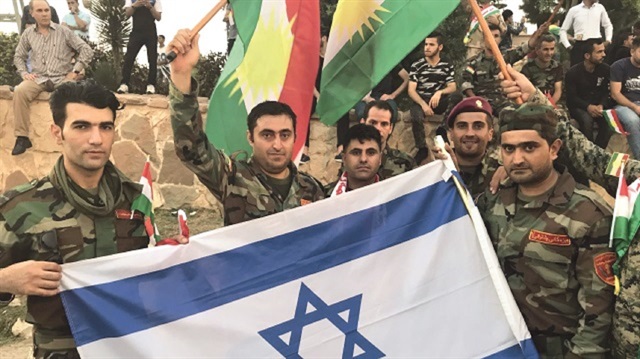

Peshmerga forces were seen waving Israel’s national flags in Erbil on Saturday.
As Israeli flags are waved and its anthem is sung in Barzani’s campaign rallies, Israel goes after ‘the promised land’
Following the declaration of a non-binding independence referendum in the Northern Iraq to be held on Sept. 25, so-called Kurdistan flags waved side by side with Israeli flags in all rallies organized by the Kurdistan Democratic Party (KDP) particularly in the United States and Western countries.
The posters used by the Kurdistan Regional Government (KRG) President Masoud Barzani in the referendum process openly included a so-called “great Kurdistan” map that contained some parts of Turkish territory, Iran and Syria. The main aim of the pirate referendum has been revealed as Israeli flags waved alongside so-called maps of Kurdistan in a rally in Erbil on Saturday. The biggest step to give Israel “the promised land” will be taken with the referendum. The process that will result in Israel’s establishment of military bases on the Turkish border will provide Zionists with a wide domain between the Nile and Euphrates rivers.

‘KURDS DESCEND FROM JEWS’
Barzani, allowing the Israeli flag to wave in Erbil, Dohuk, Sulaymaniyah, Mosul and even Kirkuk, basically serves Northern Iraq to Israel. Israeli Prime Minister Benjamin Netanyahu last month in a statement said: “Kurds are a brave, pro-Western nation who share our values” and that it was natural for Israel to support Barzani’s initiative for independence, hence publicly revealing his country’s support to the puppet state. Indeed, the thesis, “Kurds descend from Israelites” is often addressed by many Israeli institutes and media organs.
KURDS SING ISRAELI ANTHEM
Israeli flags were erected in the Erbil rally which was regarded as the last show of force before the pirate referendum. Moreover, Israeli flags were hung in most of the areas where so-called Kurdistan flags waved across Erbil. In the rallies where anti-Turkey slogans were chanted, hundreds of young people were waving the Israeli flags, and in some places Israel’s national anthem was sung. The speechmakers who canvassed for a “yes” vote in the referendum thanked Israel for their support, and often emphasized their alliance.
Tel Aviv plans to primarily divide Iraq, and then Syria following the referendum. If Israel achieves its goal, it will obtain “the promised land.” If not, the chaos that will occur in the region will weaken the Muslim countries.
Zionist line
Israel, using Masoud Barzani and the Kurdistan Workers’ Party (PKK) terrorist organization as pawns, seeks to obtain the area between the Nile and Euphrates, which is regarded as “the promised land” in the Torah. The idea to divide Syria and Iraq into small states was prepared by Zionist theorists in the 1940s and was revised under the title of the “Yinon Plan” in the 1980s. The intervention initiated by the U.S. in the ‘90s was the date when the Iraqi stage of the plan was initiated. Zionists call the “Kurdistan” that Barzani and the PKK want to establish as “Kurdo-Judaic,” the “Jewish Kurdistan.”
The non-binding referendum of the KRG on whether to declare independence from Baghdad slated for Sept. 25 carries great significance for millions of Arabs, Turkmens and Kurds in Iraq and Syria.
The Iraqi government rejects the planned poll, saying it will adversely affect the ongoing fight against the Daesh terrorist group, which still maintains a significant presence in Iraq. Baghdad also believes that holding the poll would violate the Iraqi constitution.
Turkey, too, rejects the planned referendum, saying the region’s stability depends on the unity of Iraq and the maintenance of its territorial integrity.
Washington has likewise voiced concern that the poll could serve as a “distraction” from other pressing regional issues, especially the fight against terrorism and the stabilization of post-Daesh Iraq.
#Turkey
#Iraq
#KRG
#referendum
#Masoud Barzani
#Israel





